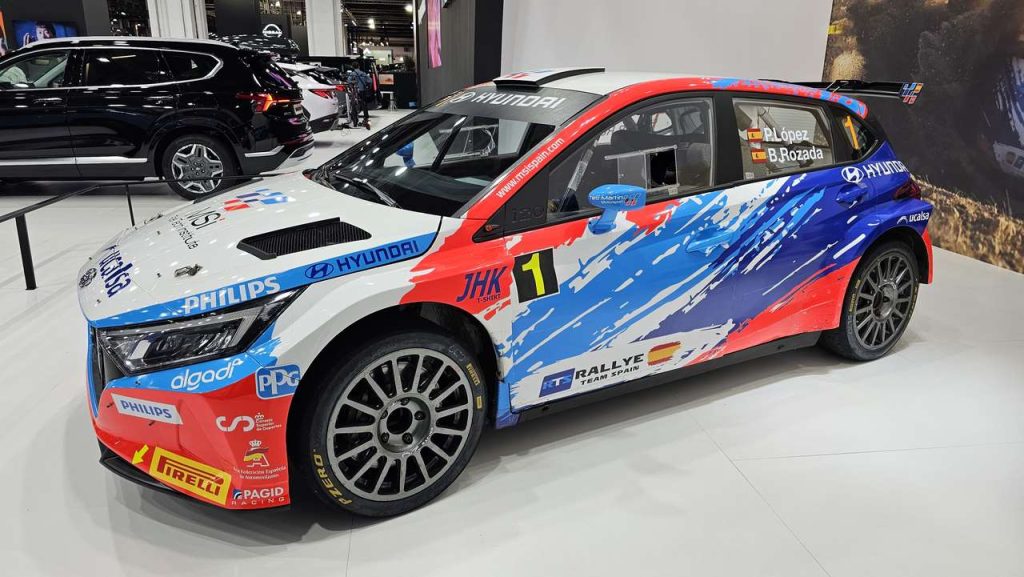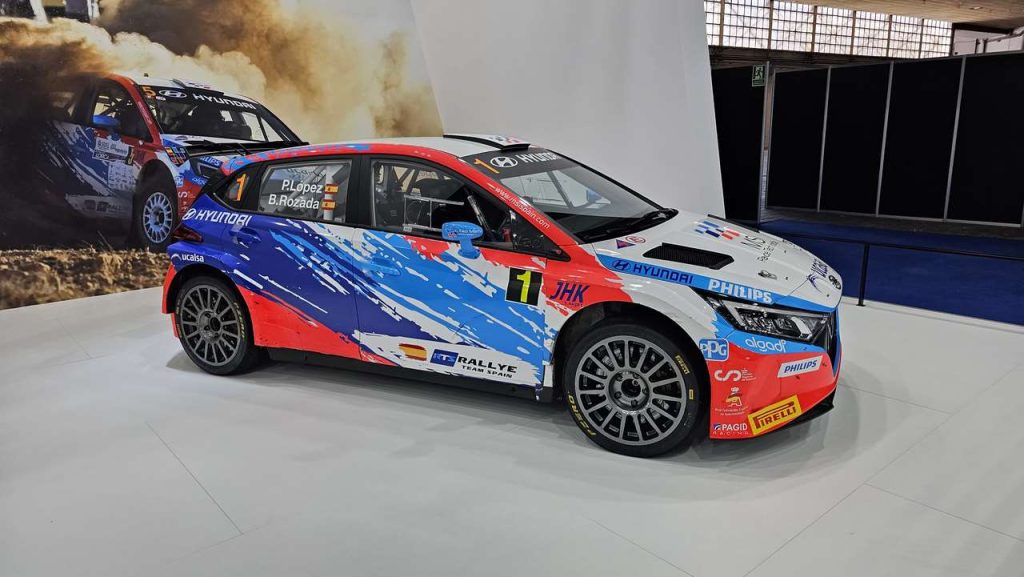The Hyundai i20 N Rally1 represents Hyundai’s contender in the top tier of the World Rally Championship (WRC), marking the beginning of the hybrid era that transformed the competition starting in the 2022 season. Forget the previous generation of World Rally Cars; the FIA (Fédération Internationale de l’Automobile) introduced revolutionary technical regulations, bringing forth cars that blend traditional combustion power with a potent electric boost, promising explosive performance on every stage.
Based visually on the acclaimed Hyundai i20 N road car, this Rally1 machine was fundamentally redesigned to meet the demanding WRC requirements. Key changes include the mandatory plug-in hybrid technology, a safer and stronger steel spaceframe chassis (a significant departure from production car shells), and a revised mechanical package that, despite an increase in minimum weight compared to its predecessors, prioritizes driver safety and reliability on the world’s toughest terrains.

Design and Mechanics of the Hyundai i20 N Rally1
While sharing a silhouette with its road-going counterpart, the i20 N Rally1 is packed with competition-specific innovations. Its hybrid powertrain integrates:
- A 1.6-liter turbocharged gasoline engine, derived from previous regulations but optimized for Rally1.
- A standard 100 kW (approximately 134 hp) electric motor supplied by Compact Dynamics (initially Kreisel Electric was involved in development stages for the standard unit).
- A 3.9 kWh battery pack.
This combination allows for short bursts of combined power exceeding 500 hp at key moments, such as launches and acceleration out of corners. The electric boost is deployed via the throttle pedal mapping, strategically managed by the teams. The battery recharges through regenerative braking during deceleration phases.
Power is transmitted through a 5-speed sequential gearbox (not a traditional manual H-pattern) and a mechanical all-wheel-drive system featuring front and rear limited-slip differentials (centre differentials are banned under Rally1 rules). This complex hybrid system and the mandatory spaceframe chassis contribute to the car weighing around 70 kg more than the previous generation WRC cars, with a minimum weight set at 1260 kg (including crew). The steel spaceframe chassis provides significantly enhanced safety and structural rigidity compared to modified production shells used previously.
Track Experience and Technological Innovations
 Principales características
Principales características
Getting behind the wheel of the i20 N Rally1 is reserved for elite rally drivers, offering an experience of pure adrenaline. Hyundai Motorsport developed this car essentially from a clean sheet to align with the new rules. The integration of hybrid power is a key factor, providing instant torque fill and boosting acceleration.
Hyundai Motorsport has campaigned the i20 N Rally1 since the start of the hybrid era at the iconic 2022 Monte Carlo Rally. Key drivers who have piloted the car include Thierry Neuville, Ott Tänak (who returned to Hyundai for 2024 after a stint with M-Sport), the late Craig Breen, Dani Sordo, Esapekka Lappi, Oliver Solberg (in its debut season), Teemu Suninen, and Andreas Mikkelsen. The team competes across the demanding WRC calendar, aiming for victories and championship titles.
Rivals in the Category
In this hybrid WRC era, the Hyundai i20 N Rally1 faces formidable rivals:
- Toyota GR Yaris Rally1: Toyota Gazoo Racing’s contender, also featuring a 1.6L turbo engine and the standard hybrid kit. It has proven highly successful, securing multiple championships.
- Ford Puma Rally1: Developed and run by M-Sport Ford World Rally Team, this car replaced the Fiesta WRC. It uses Ford’s 1.6L EcoBoost engine paired with the standard hybrid unit, presenting an equally bold and competitive package.
Each manufacturer brings its own engineering philosophy and development strategies, making the WRC a tight battle where every detail counts.
Dynamics and Sensations in Competition
Driving the i20 N Rally1 is described as pure passion on wheels. The explosive power delivery of the hybrid system is felt immediately. The sequential gearbox demands precise, rapid shifts. The car produces a raw, aggressive sound and offers immediate throttle response. Thanks to the sophisticated mechanical all-wheel drive and advanced suspension (though with reduced travel compared to previous WRC cars per regulations), it maintains precise grip through corners. While the aerodynamics are visibly less complex than the final generation of WRC cars (another regulatory change), the overall package delivers intense sensations, proving that the thrill of rallying remains potent, even with the added complexity and weight of the hybrid system.
Want a Taste? The Road-Going Hyundai i20 N
While driving the actual i20 N Rally1 is impossible for the public, its spirit and design inspiration live on in the Hyundai i20 N road car. This highly-regarded hot hatchback features a potent 1.6-liter turbocharged engine (producing around 201-204 hp depending on the market), front-wheel drive, a sport-tuned suspension, and often comes with an engaging 6-speed manual gearbox (an automatic option may also be available). It’s praised for its sharp handling and fun-to-drive character.
For enthusiasts looking to experience a slice of that N performance DNA, the road-going Hyundai i20 N can sometimes be found available for rent. While not a mainstream rental option found at every airport counter, specialized car rental agencies or performance car hire services in certain regions may offer the i20 N. This provides the closest accessible driving experience to its WRC sibling, allowing you to enjoy a spirited drive in the car that inspired the rally machine.
Main Characteristics / Considerations (Based on the provided text’s negative point):
- Negative Aspect: The increased weight (due to the hybrid system and safety structure) and potentially higher operating complexity and costs associated with the hybrid technology and strict regulations are inherent challenges of this generation of rally cars compared to simpler, non-hybrid predecessors.


